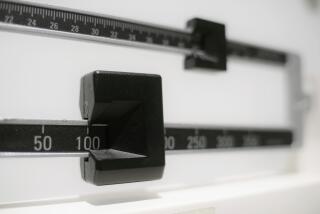Can you keep the pounds off?
- Share via
Test your knowledge of successful strategies to maintain weight loss. True or false?
Exercise aerobically at least 30 minutes per day.
False. To avoid regaining weight, you should get your heart pumping for at least an hour a day. The good news: Walking is fine.
Consume no more than 25% of calories from fat.
True. Eating mostly low-fat foods helps because you can eat a lot without consuming excessive calories. Low-fat foods often have high water and fiber content, which keeps blood sugar stable and hunger at bay.
Skip breakfast on occasion to help reduce your overall calorie consumption for the day.
False. Eating breakfast helps ensure your blood sugar doesn’t sink too low and result in your body demanding even more food the next time you eat. In the National Weight Control Registry, a survey of people who successfully lost weight and maintained the loss for at least a year, 78% ate breakfast every day.
Weigh yourself every day.
True. Weighing yourself frequently helps you recognize normal ups and downs -- as well as a trend one way or the other. In the registry, 75% of people weighed themselves at least once a week.
To avoid setting yourself up for embarrassment -- and then a total backslide -- don’t tell anyone of your plans.
False. Participation in weight-maintenance classes or Internet groups and instruction programs provides moral support -- a feeling of reward when you’re successful and renewed encouragement when you falter. It also reinforces the notion that weight loss isn’t impossible. In the registry, 55% of people lost weight with some type of program.
When you hit a weight gain of 5 pounds, throw out all the stops and return to your stringent weight-loss plan.
True. A couple of pounds can be a temporary problem, but 5 pounds suggests you need to return to a healthier eating and exercise plan pronto. Wait any longer and you may succumb to your former bad habits.
Limit calories to about 1,800 per day.
True. Your new, reduced weight means your body has less need for calories. To make sure you don’t eat more calories than you burn, aim for a low number, such as 1,800. The number of calories needed to keep weight stable, however, varies among individuals.
Eternal vigilance is necessary. Don’t overindulge, even on weekends, vacations or holidays.
True. Sorry, but consistency is key.
Keep track of everything you eat, even that handful of potato chips or that piece of candy from your co-worker.
True. Those little bits of calories add up. A cracker here, a couple of bites of cake there -- by the end of the day they’ll have sabotaged your diet. Keeping track of what you eat also allows you to pinpoint why you have added a pound or two and to address the pattern before you gain even more.
Strictly limit television time.
True. People tend to eat mindlessly, paying no attention to hunger cues, when they’re watching TV. Plus, those commercials for baby back ribs, brownies and snack foods can overcome even the best intentions. And if you’re sitting, you’re not moving. In the registry, 62% of people watch less than 10 hours of TV per week.
--
Source: National Weight Control Registry; American Heart Assn.
